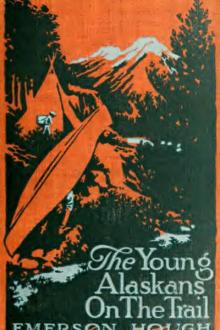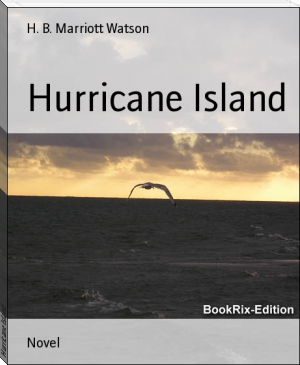The Young Alaskans by Emerson Hough (love books to read txt) 📕

- Author: Emerson Hough
- Performer: -
Book online «The Young Alaskans by Emerson Hough (love books to read txt) 📕». Author Emerson Hough
“Maybe so him stay here now,” he said, briefly, though why he thought so Rob could not tell.
No one made any attempt to pursue the whale after that. The chief, carefully wiping off the sacred nogock, again wrapped it up in its coverings, made some mysterious passes over it, and restored it to its place in his bidarka, whence, as Rob now began to understand, the guilty Jimmy had some time since stolen it.
As the boys met on the beach it must be confessed they were not thinking of their prisoner or his fate. In their excitement they were chattering to one another about the hunt, which they all agreed was the wildest and most peculiar one they had ever seen or heard of.
“You had the best of it all, Rob,” said John, enviously. “Our man wouldn’t row up any closer. My, that old whale must have looked big from where you were!”
“Well, he did, a little bit,” admitted Rob, who had lost his cap somewhere and was now bare-headed.
“That beats bear-hunting,” said Jesse, “even although we haven’t got our game yet.”
“They say he’ll come ashore maybe in two or three days,” said Rob. “Meanwhile, I suppose these natives will hang around here and wait. If they do get him, it’s very likely they’ll squat down here to eat him up, and that would take all summer! I must confess I don’t like the look of it very much.”
“And there’s Jimmy—” began John.
“That’s so! We must go and see about him.”
Quietly they edged their way out of the excited throng of natives and hurried across the sea-wall to the barabbara. Opening the door they peered cautiously in. No motion met their gaze, and although they called several times in a low tone there was no response. Passing into the barabbara they searched every corner of it. No doubt remained—their late prisoner was gone!
XVI THE MISSING PRISONERFor a time the boys sat silent and moody in the barabbara. The situation, as it appeared to them, was not a pleasant one. On the one side were half a hundred natives, whose intentions they could only guess; upon the other, as they now suspected, there might be an active enemy whose whereabouts they could only surmise. At last Rob spoke.
“It looks this way to me,” said he: “we three could not make any kind of defence against that band of natives, but perhaps they will not attack us. From what has happened, I do not think they will. Now, here is tea and salt which we got from them. That proves that they trade with the whites, which means that help may not be more than a hundred miles away at farthest. In the second place, these people think that we are here alone for only a short time and that our friends will soon be here. The thing for us to do is to keep them thinking that.”
“They’ll be over before long,” said John, “to see what has become of Jimmy, here, the man they were after.”
“I’m not so sure of that,” rejoined Rob. “These natives forget any purpose very easily; and now, as we know, they are busy watching the whale. But suppose they do come. The barabbara is empty.”
“They have not seen Jimmy at all as yet,” said John. “But suppose the bidarka is gone—he very probably took that with him.”
“Let’s go see,” suggested Jesse, and accordingly they hurried to the side of the lagoon. Sure enough, only the dory remained. The bidarka had disappeared from its resting-place.
“Now,” reasoned Rob, “he would be afraid to go out of the creek into the open bay, for then they would see him sure. There is every chance that he left the bidarka somewhere in the creek. We’ll hunt for it, then. I’ll go across in the shallow water, and we’ll search both sides of the bank. One thing sure is that Jimmy went in a hurry, because he left his gun behind. He can’t have had anything along more than his bow and arrows. We’ll know when we find the bidarka.”
So saying, they separated, and began to scour both sides of the creek, without success, however, until they nearly reached the mouth. Here, hidden in the tall grass on the farther side of the creek and close to the high rock wall near the mouth of the stream, Rob stumbled across the missing boat. With a shout he called to the others to halt, and presently, pushing the bidarka out into the creek, he paddled across to them. They all joined now in examining the contents of the boat.
“It’s just as I said,” commented Rob. “He left in a hurry, and badly scared. He could just as well have taken one of our guns as not, but we know he did not do that, and even left his own. Here’s his spear and his paddles. His blankets are back at the hut. So far as I can see, he took only his fishing-line and his bow and arrows.”
“Yes, but he may come back again,” suggested Jesse.
“I hardly think so,” reasoned Rob. “At any rate, he’ll not come back so long as these people hang around, because he knows they’re after him. Besides, the fact that he didn’t steal anything from us shows that he is getting scared about stealing. I’m not so uneasy about him as I am about these other fellows over on the beach.”
None too happy, the boys now proceeded to paddle the bidarka up the creek to its old resting-place in the lagoon, after which they busied themselves rather half-heartedly about camp work, a part of which was further fleshing of the bear hides. As they were engaged at this they heard a faint rustling in the dry grass near at hand. Startled, they looked around, and saw something staring at them from the cover. John reached for his rifle.
“Don’t shoot!” called Rob. “It’s a boy! I see his face plainly now.”
XVII THE ALEUT BOYThey advanced toward the intruder, who stood up, grinning and showing a set of very white teeth. He was an Aleut boy about twelve years of age, short and squat, with stringy, dark hair. He was clad in a smock, or jacket, of sea-parrot feathers, which came down to his seal-skin boots. In one hand he held a short spear, in the other several thongs to which were attached bits of ivory. He seemed not in the least alarmed, but, on the contrary, much disposed to be friendly.
“Karosha!” called out John to him. “All right, all right, all right!”
John seemed to pick up easily the expressions which the Aleuts used and understood.
Hesitatingly, but still smiling, the boy joined them, and walked with them over toward the bear hides, where he stood looking down. At last, as they resumed their work at the hides, he himself squatted down, and taking out his own knife—a mere bit of steel bound around at the end with rags and hide for a handle—he also began to scrape away. So much greater was his skill than theirs that at last he smiled at their awkwardness. For the time he made no attempt at any kind of speech, and answered no questions in regard to his people. At last, as Jesse departed to the top of the sea-wall to learn what was going on along the beach, he began to jabber and attempt to make some signs. John guessed that he meant to say that in a couple of days the whale would come ashore; that then his people would build fires and eat.
“Maybe he’d like to eat a little himself,” concluded John. “Suppose we try him on some bear meat.”
Their offer seemed very acceptable to the Aleut boy, who in a very matter-of-fact way began to hunt around in the grass for fuel and to prepare to make a fire, which latter he did with skilful use of one of the few matches which he kept dry in a membrane pouch in an inner pocket.
“He’s camped out before,” said Rob. “It looks as though he had adopted us. Maybe he likes the look of our meat-rack better than he does the prospect of waiting over there for the whale to come ashore.”
The young Aleut put his pieces of bear meat on sticks, which he stuck up near the fire; and while they were broiling he himself ran over toward the beach, presently reappearing with some dark-looking stuff in his hands, which he offered his friends, making signs that it was good to eat.
“Smoked breast of wild goose,” commented John, smacking his lips. “It’s good, too. I wouldn’t mind having some more of that.”
Whether or not the boy understood it was impossible to say; but all at once he began to flop his arms up and down, quacking and honking in imitation of wild fowl. He pointed to a spot far up at the head of the lagoon, and then, picking up his bunch of thongs and ivory balls, whirled them around his head.
Rob’s eyes kindled.
“We can’t afford to use rifle ammunition to shoot birds, but if we can get this boy to go along on a goose-hunt we may have a new sort of fun, and maybe get some game.”
The young Aleut showed no disposition to return to his own people, and when at length, after they had all eaten heartily, the three friends turned toward the door of the barabbara, he followed them as though he had been invited.
“What are we going to do with this boy?” asked Jesse. “He acts as if he belonged here.”
“Maybe he does,” said John. “I saw him talking to the old chief, and maybe he’s his son. I have more than half a guess that the old man does own this house, anyhow.”
As the sun began to sink toward the horizon a wind arose and dark clouds overspread the sky.
“I don’t blame the boy for wanting to stay here where he will be dry. If I’m not mistaken, we are going to have rain and plenty of it. Meantime, we might as well turn in and go to sleep,” added Rob.
He motioned the young Aleut to the blankets which Jimmy had abandoned, and the latter, without ado, curled himself up on them. The others, tired enough, followed his example, and for that night at least they did not trouble themselves to keep any watch. Perhaps they had never had greater cause for vigilance, but their anxiety was lost in the bodily weariness which came over them after so many stirring incidents.
XVIII UNWELCOME VISITORSAfter the edge of their weariness had worn off with their first heavy slumbers, the mental anxiety of the young adventurers began to return, and they slept so uneasily that when morning came they all awoke with a start at the sounds they heard outside the barabbara.
Rain and heavy wind had begun some time in the night; but now they heard something else—the swishing of feet in the wet grass and the sound of low voices.
The young Aleut was awake also, but he smiled as he sat up on the blankets.
“I don’t think we need be alarmed,” said Rob, in a low tone to his friends. “If these people had meant us any harm we’d have been foolish to go out in their boats with them and leave





Comments (0)